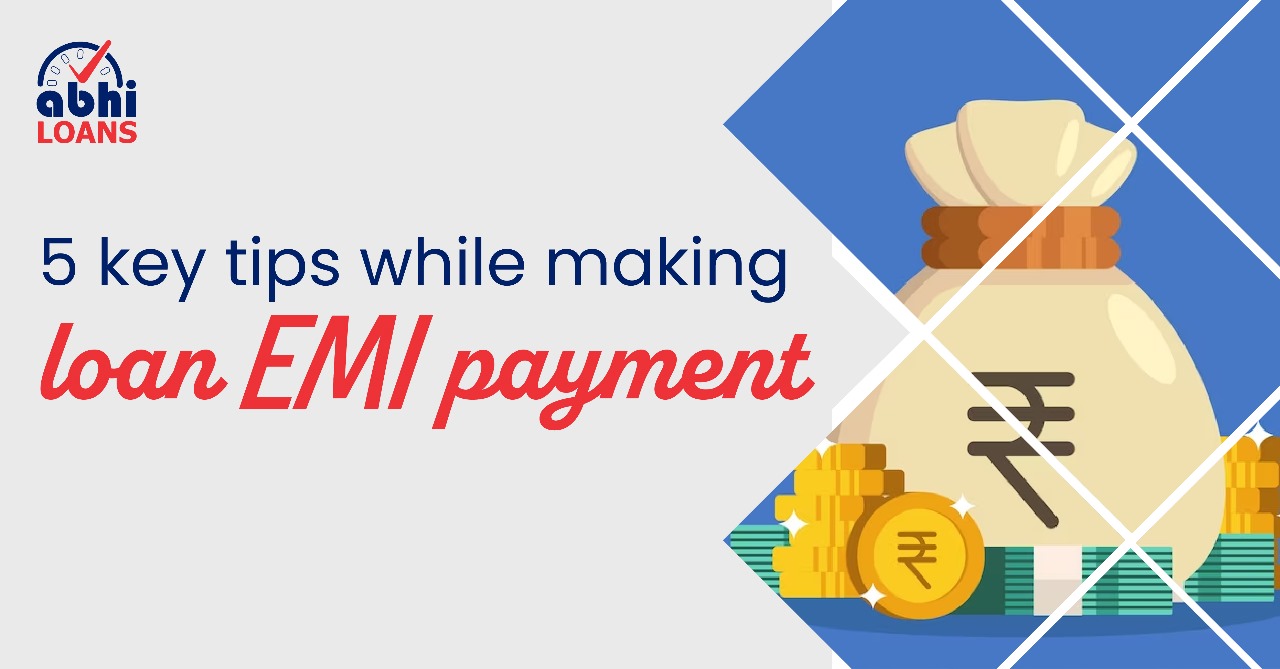5 key tips while making loan EMI payment
Taking out a loan is a significant financial decision that often involves repaying the borrowed amount through Equated Monthly Installments (EMIs). The EMI system allows borrowers to manage their repayments in manageable chunks, making it easier to fulfill financial obligations.
However, successfully navigating loan EMI payments requires careful planning and responsible financial management. In this blog, we’ll delve into five key tips that will help you make your loan EMI payments with ease and maintain a strong financial standing.
Key Tips for Making Loan EMI Payments
Understand your Loan Agreement
Before embarking on your loan repayment journey, it’s essential to have a clear understanding of the terms and conditions laid out in your loan agreement. Take the time to review the agreement thoroughly. Note crucial details, such as the interest rate, loan tenure, and repayment schedule.
If you have any doubts or questions, don’t hesitate to reach out to your lender for clarification. A solid understanding of your loan agreement will lay the foundation for successful EMI payments.
Budgeting and Planning
Budgeting is a crucial aspect of managing your finances effectively. Evaluate your monthly income and expenses to create a comprehensive budget that accommodates your loan EMI payments. Allocate a specific portion of your income to cover your EMIs without straining your overall financial stability.
This step will ensure that your EMI payments are well-integrated into your financial plan, reducing the risk of missed payments.
Set Up Automatic Payments
To eliminate the possibility of forgetting EMI due dates and incurring late payment fees, consider setting up automatic payments. Most lenders offer this option, allowing you to authorize automatic debits from your bank account on the designated EMI due date.
Ensure that you have sufficient funds in your account to cover the payment. This simple step can save you from unnecessary stress and financial penalties.
Prioritize Timely Payments
Timely EMI payments are not only a financial responsibility but also a strategic move to maintain a positive credit history. Set up reminders or alerts to notify you of upcoming due dates.
Aim to make your payments before the due date to avoid any late fees or increased interest rates. Maintaining a buffer period can be helpful, especially if unforeseen circumstances arise that might temporarily affect your finances.
Emergency Planning
Life is full of uncertainties, and it’s wise to be prepared for them. Build an emergency fund that can cover unexpected expenses, ensuring that your EMI payments remain unaffected.
In case you encounter financial difficulties, don’t hesitate to communicate with your lender. Some lenders offer options like loan restructuring or deferment, which can provide temporary relief while you get back on track.
Benefits of Following These Tips
By implementing these tips for successful loan EMI payments, you can experience several benefits that contribute to your overall financial well-being:
Financial Stability:
Following a well-structured financial plan helps reduce stress and ensures you’re always in control of your finances.
Savings on Penalties:
Avoiding late payment fees and increased interest rates helps you save money in the long run.
Improved Credit Score:
Timely EMI payments positively impact your credit score, enhancing your future borrowing prospects and financial opportunities.
Conclusion
Managing loan EMI payments doesn’t have to be a daunting task. With a proactive approach and responsible financial practices, you can make your EMI payments without unnecessary stress or financial setbacks.
Remember to understand your loan agreement, budget effectively, set up automatic payments, prioritize timely payments, and have a solid emergency plan in place. By implementing these five key tips, you’ll not only master your loan EMI payments but also set yourself on a path of financial success.
FAQs
What is an EMI, and why is it important to manage it effectively?
An Equated Monthly Installment (EMI) is a fixed payment amount made by borrowers to lenders at a specified date each month. Managing EMI payments effectively is crucial because it ensures timely repayment of the loan, prevents penalties, and helps maintain a positive credit history, which is essential for future financial endeavors.
How can I ensure that I have allocated a proper budget for my EMI payments?
To allocate a suitable budget for EMI payments, evaluate your monthly income and expenses. Create a comprehensive budget that includes not only EMI payments but also other necessary expenditures. Ensuring that your EMI payments fit comfortably within your budget helps prevent financial strain and ensures timely repayments.
Is it advisable to set up automatic payments for loan EMIs?
Yes, setting up automatic payments for loan EMIs is highly recommended. This helps you avoid the risk of forgetting due dates, late payment fees, and potential negative impacts on your credit score. With automatic payments, the designated amount is debited from your bank account on the specified date, ensuring timely repayments.
What should I do if I encounter unexpected financial difficulties that affect my EMI payments?
If you face unexpected financial challenges that make it difficult to meet your EMI payments, it’s important to communicate with your lender immediately. Many lenders offer options like loan restructuring, deferment, or temporarily adjusting the repayment schedule to accommodate your situation. Ignoring the issue could lead to penalties and negative credit consequences.
Can making early EMI payments be beneficial, and how does it impact the loan repayment process?
Making early EMI payments can indeed be beneficial. Early payments reduce the outstanding principal amount, which, in turn, decreases the interest accrued over time. This can help you pay off the loan faster and potentially save on interest costs. However, ensure that your lender doesn’t have any prepayment penalties or specific terms related to early payments.

